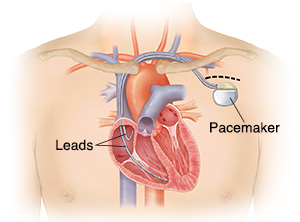Permanent Pacemaker Implantation
Singapore
-
Our Price USD 23622
-
Hospital Price USD 24865
-
You Save : USD 1243
Booking Amount: USD 2362. Pay Remaining 90% at the hospital.
Book NowAdditional Credit
Among the important extras we offer as part of the Additional Credit are the following:
-
Site Tourism For The Patient & Attendant
-
Airport Pick & Drop Service
-
Ambulance service at airport
-
Priority appointments with The Doctor
-
Cancel Easily Anytime with Full Refund
-
Room Upgradation
-
Free Online Doctor Consultation Valued at USD 20
-
Free hotel Stay for 5 to 7 days Accordingly
-
Welcome Kit at Arrival
-
Interpreter
-
Medical Visa Assistance
What is Included?
- Doctor consultation charges
- Lab tests and diagnostic charges
- Room charges inside hospital during the procedure
- Surgeon Fee
- Cost of implant
- Nursing charges
- Hospital surgery suite charges
- Anesthesia charges
- Routine medicines and routine consumables (bandages, dressings etc.)
- Food and Beverages inside hospital stay for patient and one attendant.
What is not Included?
- Extra Radiology Investigations
- Healthcare Professionals Charges of other consultations.
- Other Requested Services such as Laundry etc.
- Additional Pharmaceutical Products and Medicines After Discharge from Hospital.
- Management of Conditions Unrelated to Procedures or Pre-Existing.
- The cost of any additional implants will be in addition to the package cost.
Package Description
Permanent Pacemaker Implantation:
A pacemaker is a little device (about the size of a matchbox) that is implanted in the chest or abdomen and administers mild electrical impulses to the heart muscles to keep the heart rate stable. It's also used to treat heart failure, syncope (fainting episodes), and some heart muscle problems (hypertrophic cardiomyopathy).
Pacemakers, on the other hand, are most commonly used to treat aberrant cardiac rhythms (arrhythmias). The pace and rhythm of the heartbeat are controlled by the heart's internal electrical circuitry. During a heartbeat, the heart's natural pacemaker (the sinoatrial or SA node) sends electrical impulses to various sections of the heart, causing phasic contraction and relaxation of various portions of the heart. The heart can pump blood frequently and effectively to satisfy the body's needs with a normal beating.
An endocardial or epicardial technique can be used to install a pacemaker. The most prevalent procedure is the endocardial (transvenous) approach. To numb the region, a local anaesthetic (pain-relieving medicine) is administered. The leads and pacemaker are implanted through an incision in the chest.
Disease Overview:
Bradycardia:
Bradycardia is characterized by a heart rate of fewer than 60 beats per minute. While resting or sleeping, the heartbeat of some otherwise healthy patients may decrease to less than 60 beats per minute. This is normally asymptomatic and does not necessitate therapy.
Signs and Symptoms
A heartbeat that is slower than usual (bradycardia) can hinder the brain and other organs from receiving adequate oxygen, resulting in the following indications and symptoms:
- Pain in the chest.
- Confusion or memory issues are common.
- Lightheadedness or dizziness.
- During physical exertion, it is easy to become exhausted.
- Fatigue.
- Syncope (fainting) or near-fainting.
Disease Causes:
Bradycardia can be caused by
- Aging-related heart tissue deterioration.
- Heart disease or a heart attack can cause tissue damage to the heart.
- A congenital cardiac abnormality that is evident at birth (congenital heart defect)
- Heart tissue inflammation (myocarditis)
- A cardiac surgery problem.
- A thyroid gland that is underactive (hypothyroidism)
Disease Diagnosis:
A health care practitioner will generally do a physical exam and listen to your heart with a stethoscope to diagnose bradycardia. He or she may inquire about your symptoms and medical background.
Tests to evaluate your heart rate and discover whether you have a cardiac condition that might cause bradycardia may be recommended by your doctor. Blood tests may be performed to rule out other causes of slow heartbeats, such as illness, hypothyroidism (underactive thyroid), or electrolyte imbalance.
Tests
The most common test for bradycardia is an Electrocardiogram (ECG or EKG). The electrical activity of the heart is measured by an ECG. Sticky patches (electrodes) are applied to the chest, as well as the arms and legs in some cases. The electrodes are connected to a computer through wires, which shows the results. An electrocardiogram (ECG) can reveal if the heart is beating too slowly, too quickly, or not at all.
Your health care physician may prescribe a portable ECG equipment since an ECG can't identify bradycardia unless the slow heartbeat happens during the exam. The following are examples of portable ECG devices:
Holter monitor is a device that records heartbeats. This gadget, which may be carried in a pocket or worn on a belt or shoulder strap, records the heart's activity for up to 24 hours.
Recorder of events. This gadget is comparable to a Holter monitor, except it only records for a few minutes at a time at specific periods. It is normally worn for 30 days, which is longer than a Holter monitor. When you have symptoms, you usually press a button. When an abnormal cardiac beat is identified, certain devices begin recording automatically.
To further understand how bradycardia affects you, an ECG may be used with additional testing. These tests include the following:
Test using a tilted table. This test might assist your doctor figure out how your bradycardia is causing your fainting spells. The table is slanted as though you were standing up while lying flat on a special table. To assess if a change in posture induces fainting, a tilt test is performed.
Exercise stress test While riding a stationary bicycle or walking on a treadmill, an ECG can be used to monitor your heart's activity. If you have trouble exercising, a medicine that stimulates the heart in a similar way as exercise may be prescribed.
If your health care practitioner suspects that recurrent pauses in breathing during sleep (obstructive sleep apnea) are causing bradycardia, a sleep study may be performed.
Disease Treatment:
The severity of the symptoms and the reason of the slow heart rhythm determine the treatment for bradycardia. Treatment may not be essential if you don't have any symptoms.
Treatment for bradycardia may involve lifestyle modifications, medication adjustments, or the implantation of a pacemaker. If the slower than usual heartbeat is caused by an underlying health problem, such as thyroid disease or sleep apnea, therapy for that illness may be able to remedy bradycardia.
Medications
Bradycardia can be caused by a variety of drugs, including those intended to treat other cardiac diseases. Always tell your doctor about all drugs you're taking, even ones you obtained without a prescription.
If a medicine you're taking is producing bradycardia, your doctor may suggest lowering the dose or switching medications.
Surgical or non-surgical techniques
When alternative therapies are ineffective and bradycardia symptoms are severe, a pacemaker is used to regulate the heart's rhythm. Pacemakers are only activated when they are required. The pacemaker gives electrical instructions to the heart to speed up the rhythm when it beats too slowly.
Implanting a pacemaker necessitates a surgical procedure. Using X-rays as a guide, one or more wires are put into a major vein under or near the collarbone and led to the heart. Each wire has one end attached to a device (pulse generator) inserted behind the skin beneath the collarbone, while the other end is attached to a device (pulse generator) implanted beneath the skin beneath the collarbone.
A leadless pacemaker is often smaller and requires less invasive surgery to implant.
Information related to Treatment
Package Details
Days in Hospital
3 Days
Days in Hotel
*
11 Days
Room Type
Private
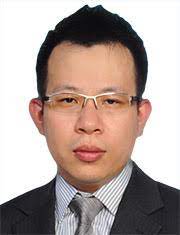
Treating Doctor
Adjunct Associate Professor Chia Yew Woon
Cardiologist- Critical care, Critical care, Mechanical Ventilation, Hemodynamic monitoring, Critical Care Medicine, Critical care
Tan Tock Seng Hospital, Singapore Singapore, Singapore
21 Years of Experience

Treating Doctor
Clin Prof Chua Siang Jin Terrance
Cardiologist- Nuclear medicine, Cardiovascular Surgery, High blood Pressure, Chest Pain Treatment, Coronary Artery Disease, Chest Pain Treatment
National Heart Centre Singapore Singapore, Singapore
Years of Experience

Treating Doctor
Clin Prof Chua Siang Jin Terrance
Cardiologist- Nuclear medicine, Hypertension Specialist, Cardiovascular Surgery, Coronary Artery Disease, Chest Pain
Sengkang Community Hospital, Singapore Singapore, Singapore
Years of Experience
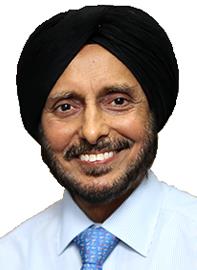
Treating Doctor
Dr Baldev Singh
Cardiologist- Interventional cardiology, Minimally invasive Cardiac Surgery
Parkway East Hospital, Singapore Singapore, Singapore
Years of Experience
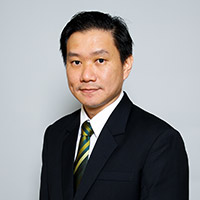
Treating Doctor
Dr Hong Cho Tek Eric
Cardiologist- Interventional cardiology, Sports cardiology, Preventive cardiology and Cardiac Rehabilitation, Nuclear medicine, Cardiac resynchronisations, CT angiogram, PET scan
Mount Elizabeth Hospital, Singapore Singapore, Singapore
25 Years of Experience

Treating Doctor
Dr Lin Weiqin
Cardiologist- Echocardiography, Heart transplant, Heart Failure Treatment, Cardiac Surgeon, Minimally invasive Cardiac Surgery, Heart transplant, Cardiomyopathy, Echocardiography, Echocardiography
National University Hospital, Singapore Singapore, Singapore
Years of Experience
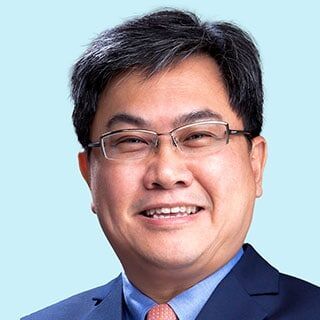
Treating Doctor
A/Prof Philip Wong En Hou
Cardiologist- Interventional Cardiologist, Cardiac Catheterisation, PCI (Percutaneous Coronary Interventions), Cardiac Catheterisation, Cardiac Catheterisation
Raffles Hospital, Singapore Singapore, Singapore
Years of Experience

Treating Doctor
Dr Liew Boon Wah
Cardiologist- Interventional cardiology, Coronary Artery Bypass Grafting, Coronary Artery Bypass Grafting, Coronary Artery Disease
Changi General Hospital, Singapore Singapore, Singapore
Years of Experience
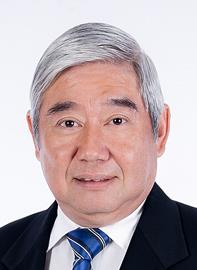
Treating Doctor
Dr Chan Wah Hak Nien-Shen Charles
Cardiologist- Aortic valve surgery, Congenital heart surgery, Carotid Angioplasty And Stenting, Hypertension Treatment, Cardiac Arrhythmias, PTCA or Coronary Angioplasty, Valvuloplasties, Coronary interventions, Hypertension Treatment, Carotid Angioplasty And Stenting
Gleneagles Hospital, Singapore Singapore, Singapore
Years of Experience
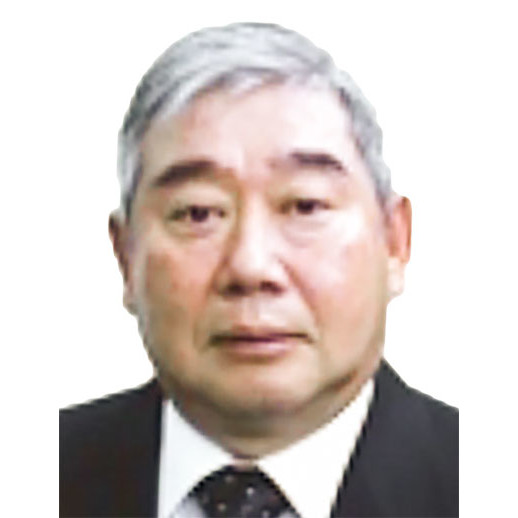
Treating Doctor
Dr. Charles Chan
Cardiologist- Aortic valve surgery, Heart Specialist, Heart Specialist, Heart Failure Treatment, Heart Specialist, Carotid Angioplasty And Stenting, Balloon Valvuloplasty, Cardiac Arrhythmias, Myocardial Infarction Treatmentq, Coronary interventions, peripheral interventions, Carotid Angioplasty And Stenting
Farrer Park Hospital, Singapore Singapore, Singapore
33 Years of Experience

